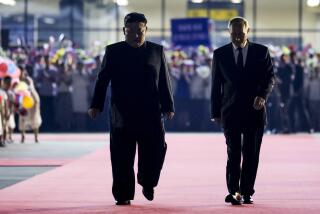In the Name of the Father? : Mysterious Kim Jong Il’s ascension poses questions for Koreas, and world
- Share via
In a society as closed and as antediluvian as North Korea, it is difficult to believe that the death of the maximum leader will be without significant consequence.
Kim Il Sung--the mysterious dictator of a country that time seems to have forgotten in some ways--leaves as his legacy a society all but closed to the outside world and all but strangled by its mindless adherence to a communist orthodoxy that is extreme and bizarre even by the standards of the bygone communist world. And he bequeathed to his countrymen Kim Jong Il, his even more mysterious son, whom official Pyongyang radio was quick to describe as his father’s rightful successor.
For South Korea, with its energetic and entrepreneurial economy, the hope is that at the very least Kim Jong Il will prove no more erratic or menacing than his father. The South Koreans have done a remarkable job of getting on with their destiny in recent years--building up their economy and moving, however slowly, toward true democracy.
From Seoul’s perspective, overnight reunification is not to be desired; instead, South Korea prefers slow, cautious and carefully plotted moves toward normalization and then maybe--well down the road--talks about some form of unification.
For the United States, the death of Kim Il Sung came just as talks over Pyongyang’s nuclear program had begun in Geneva. U.S. and North Korean officials have agreed that the talks be interrupted, with the expectation that they will be resumed. Also postponed is the unprecedented meeting between the North and South Korean heads of state, which had been scheduled for July 25 in Pyongyang.
Kim Il Sung died just as U.S.-North Korean relations appeared to be moving off dead center. The history of the U.S.-North Korean dialogue hardly encourages an abundance of confidence in Pyonyang’s commitment to resolving the crisis it precipitated with its ambiguous but alarming experimental nuclear reactor. Now the son follows the father. Will North Korea revert to the Dark Ages? Or is it ready to begin remaking itself and become a full member of the international community--and a more modern economy that can better serve its long-deprived people?
More to Read
Sign up for Essential California
The most important California stories and recommendations in your inbox every morning.
You may occasionally receive promotional content from the Los Angeles Times.













